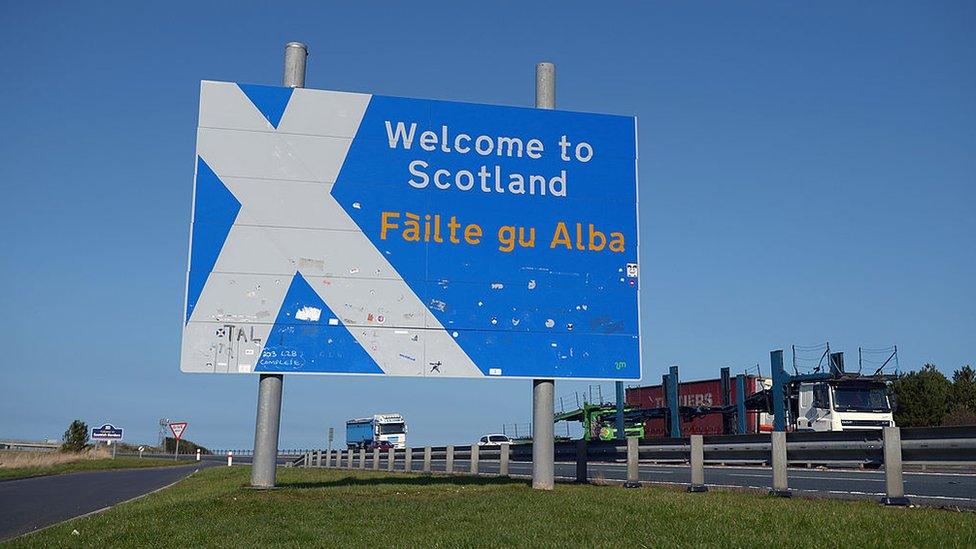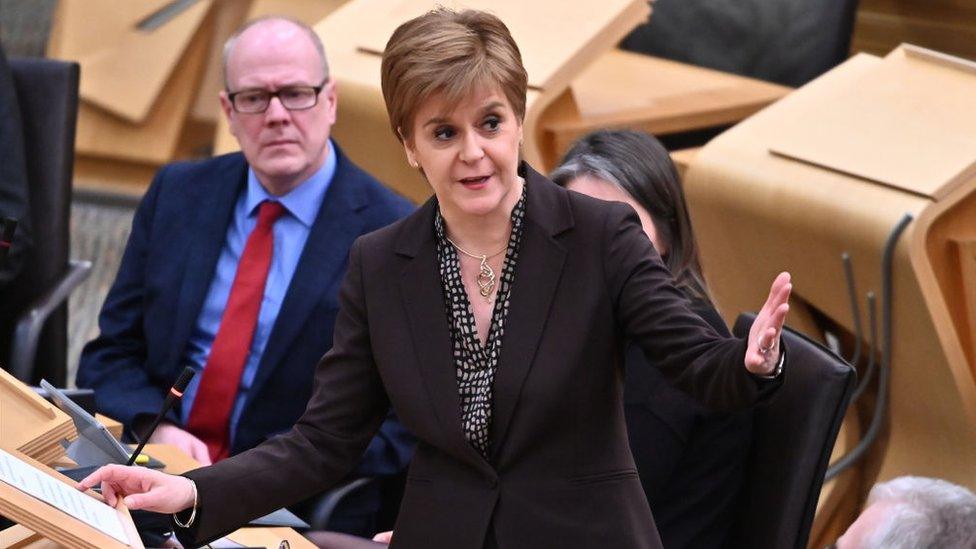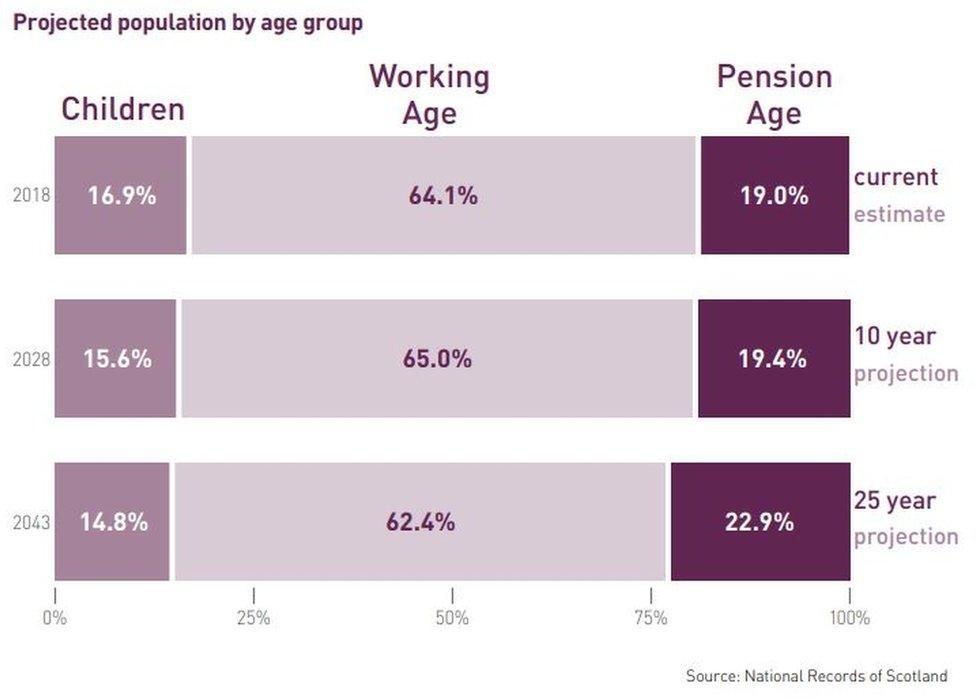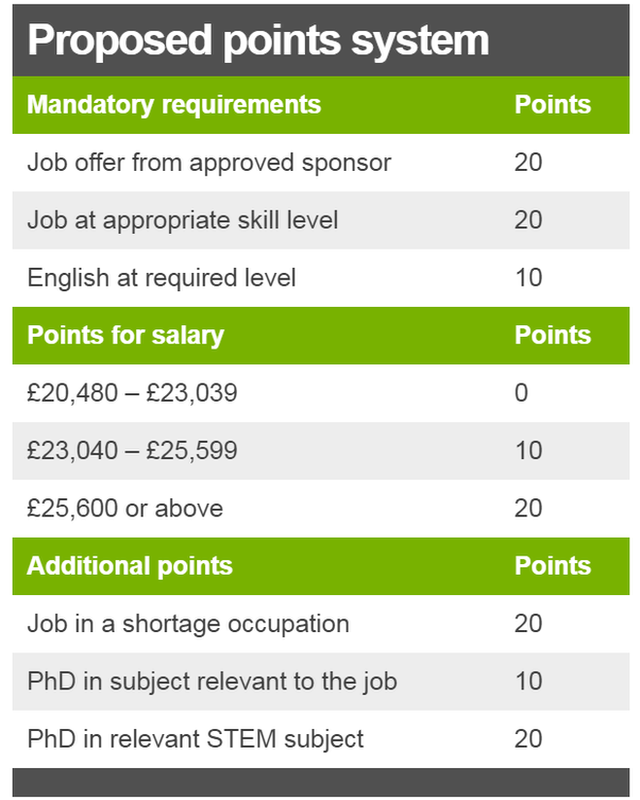UK immigration plans 'devastating' for Scotland, says Sturgeon
- Published
- comments

The UK government's plans for immigration would be "devastating" for Scotland, Nicola Sturgeon has claimed.
The Home Office has set out plans for a post-Brexit system which would not give visas to low-skilled workers.
UK ministers want to "move away" from "cheap labour" from Europe and instead target the "brightest and best".
But Scotland's first minister said it would be "impossible to overstate how devastating" this would be, making it "much harder" to attract workers.
She wants powers over migration to be devolved to Holyrood so a separate system can be established north of the border.
The UK government is keen to set up a "points-based" immigration system after the free movement of people between the UK and the EU ends on 31 December, when the Brexit transition period expires.
Home Secretary Priti Patel told BBC Breakfast that the government wants to "encourage people with the right talent" and "reduce the levels of people coming to the UK with low skills".
UK ministers have set out to reduce the overall level of migration to the UK, encouraging employers to invest in retaining staff and developing automation technology instead of "cheap labour" from abroad.
However, Ms Sturgeon argues that with population growth stalling in Scotland, more immigration is needed to boost the working-age population.
Allow X content?
This article contains content provided by X. We ask for your permission before anything is loaded, as they may be using cookies and other technologies. You may want to read X’s cookie policy, external and privacy policy, external before accepting. To view this content choose ‘accept and continue’.
She said: "Our demographics mean we need to keep attracting people here - this makes it so much harder.
"Getting power over migration in the Scottish Parliament is now a necessity for our future prosperity."
The Scottish government is arguing for a "fundamentally different approach to migration policy" north of the border, calling for an "evidence based approach which reflects the needs of our economy".
Scotland Office minister Douglas Ross insisted that "the new system will work for Scotland and the whole of the UK".
He said: "It will support our renowned universities and world beating high tech sector. It avoids putting up barriers to business by splitting our UK-wide system and it ensures our whole economy can continue to grow."

Nicola Sturgeon wants extra powers to be devolved to Holyrood for a separate immigration system
What are Scotland's demographic challenges?
The National Records of Scotland has projected that Scotland's working-age population could shrink in the coming years.
Births look set to outweigh deaths over the next 25 years, while life expectancy is on the rise. The group's projections say there could be 240,000 more pensioners by 2043 - and 7,000 fewer people of working age.
In a recent paper on migration, external, Ms Sturgeon said there was a "serious issue" with long-term demographic changes, saying that "all of our future population growth is projected to come form migration, and any reduction in migration will impact on the size of our working-age population".
However, the Migration Advisory Committee has argued that these demographic challenges are not unique to Scotland.
In a report in September 2018, the group said that "lower migration might lead to population decline", but said "some northern English regions have similar prospects" - concluding that "we were not of the view that Scotland's economic situation is sufficiently different from that of the rest of the UK to justify a very different migration policy".
Studies have also suggested that Scots have broadly similar attitudes to immigration as an economic asset as people in England and Wales.

The National Records of Scotland predict the working-age population will shrink in the coming years
How would a points-based system work?
The UK government has long argued in favour of a "points-based" immigration system for all migrants.
Points would be allocated for things like having a job offer in a sector with staffing shortages, speaking English, and having higher education qualifications.
In total, candidates would need 70 points to qualify.
Overseas workers who speak English have the offer of a skilled job with an "approved sponsor" would accrue 50 points - needing 20 more from the other criteria.
The UK government says it is "important employers move away from a reliance on the UK's immigration system as an alternative to investment in staff retention, productivity and wider investment in technology and automation".
On "skilled" workers, the proposals would see this definition include those educated to Scottish Higher or A-level equivalent standard - not just graduate level, as is currently the case.
Waiting tables and certain types of agricultural worker would be removed from the new skilled category, but new additions would include carpentry, plastering and childminding.

How would a Scottish visa work?
At present, migration policy is entirely controlled from Westminster - but Scottish ministers want extra powers to be given to Holyrood to set up a distinct system.
They propose adding a Scottish-specific visa to the immigration system, which migrants could choose to apply for instead of one of the existing routes.
MSPs would decide the criteria for this new visa, and the Scottish government would receive and assess applications before sending them to the UK government for security checks.
Those applying for such a visa would need to remain resident in Scotland and pay tax locally, but would have a route to permanent settlement - unlike existing schemes for unskilled or temporary workers.
Ms Sturgeon says this would "allow Scotland to attract and retain people with the skills and attributes we need for our communities and economy to flourish".
However, the proposals were swiftly rejected by Prime Minister Boris Johnson, who said they were "absolutely fanciful and deranged".
He said he had "every sympathy with the businesses and industries of Scotland that need to allow workers to come freely", pointing to plans to expand the entry scheme for seasonal agricultural workers.
- Published19 February 2020

- Published27 January 2020

